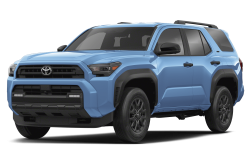
2026 BMW
|

2025 Toyota
|
|
| MPG - City | 25 - 27 MPG | 19 - 20 MPG |
| MPG - Hwy | 30 - 33 MPG | 24 - 26 MPG |
| Seating Capacity | 5 seats | 5 - 7 seats |
| Cargo Space | 67.1 ft3 | 90.2 ft3 |
| Engine |
|
|
| Transmission | Automatic | Automatic |
| Drivetrain | All Wheel Drive | Four Wheel Drive, Rear Wheel Drive |
| Horsepower | 255 - 393 hp | 278 hp |
| Towing Capacity | 4,001 - 4,850 lbs | 6,000 lbs |
| Exterior Length | 187.2 in | 194.9 in |
| Exterior Width | 75.6 in | 77.9 in |
| Leg Room | Info not available |
Front 41.8 in
Rear 34.8 in |
| Head Room | Info not available |
Front 39.7 in
Rear 37.8 in |
*MSRP and Invoice prices displayed are for educational purposes only, do not reflect the actual selling price of a particular vehicle, and do not include applicable gas taxes or destination charges.
Convenience
The BMW X3 requires fewer stops at the gas station than the Toyota 4Runner, making it more convenient to drive.
Cost
There are a lot of factors to consider when calculating the overall cost of a vehicle. The main consideration is Manufacturer's Suggested Retail Price (MSRP). The BMW X3 is somewhat more expensive than the Toyota 4Runner.
Dimensions
Since the BMW X3 is much slimmer than the Toyota 4Runner, it'll be much easier to find a wide enough space in a crowded parking lot.
The BMW X3 is slightly shorter than the Toyota 4Runner, which may make it easier to park.
Handling
The BMW X3 has the same turning radius as the Toyota 4Runner, so they both maneuver the same in and out of tight spots.
Performance
In terms of towing capacity, the Toyota 4Runner is clearly the choice over the BMW X3 for pulling heavy loads.
The BMW X3 has a little less horsepower than the Toyota 4Runner.
Powertrain
With its lower torque engine, the BMW X3 doesn't do as good a job transmitting power to its wheels as the Toyota 4Runner.
Utility
In terms of seating, you'll be able to fit about the same number of people in both the BMW X3 and the Toyota 4Runner.
The BMW X3 has significantly less cargo capacity than the Toyota 4Runner.